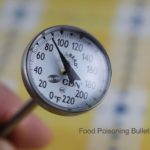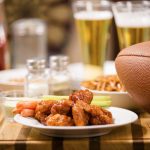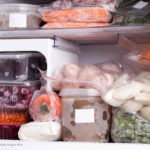The USDA is reminding consumers to wash hands and use a food thermometer this summer to avoid foodborne illness. These rules apply even when you are camping, grilling outdoors, or having a picnic. The USDA has observed, in their test kitchens, that consumers are skipping basic food safety practices, which increases the risk of suffering food poisoning. USDA Deputy Under Secretary for Food Safety Sandra Eskin said in a statement, "Our research shows that participants were not adequately washing their hands or using a food thermometer. Summer is a time to relax and enjoy delicious meals with friends and family but foodborne pathogens never rest. Following safe food handling practices during this and all other seasons can reduce the risk of you and your loved ones getting sick." A … [Read more...]
With Warmer Weather Here, Keep Food Safety in Mind
With warmer weather here at last, it's important to keep food safety in mind with these tips from the Michigan Department of Agriculture and Rural Development. Picnics and barbecues mean that you are eating and preparing food in weather more conducive to the growth of potentially harmful bacteria. You should always take precautions when preparing, holding, and serving foods, but those precautions are especially important when the ambient air temperature is high. Tina Slawinski, MDARD's Food and Dairy Division Director, said in a statement, "Food which hasn’t been cooked or stored properly can cause mild foodborne illness, but it can also lead to serious illness or even death. Whether you’re packing a picnic for a sporting event or outdoor recreation, or planning a backyard barbecue, … [Read more...]
Tips for Easter Egg Hunt Safety From Fight Bac
Get tips for Easter egg hunt safety from Fight Bac. Remember that eggs are perishable foods just like meat and poultry, and should be cooked thoroughly and handled with care. Even clean, uncracked eggs can, and have been, contaminated with Salmonella and Listeria monocytogenes bacteria and have caused many illnesses. When you are coloring eggs for AEser, only use eggs that have been refrigerated, and discard any cracked or dry eggs. To cook eggs, place a single layer in a cause pan and add cold water to cover the eggs by one inch. Bring the water to a full rolling boil, then remove the pan from the heat and cover it. Let the eggs stand for 18 minutes for extra large, 15 minute for large, ant 12 minutes for medium. Then drain the eggs and immediately run cold water over them. You … [Read more...]
Senator Murray Wants Answers on Alleged Food Safety Failures
Senator Patty Murray (D-WA) wants answers on alleged FDA food safety failures after a report in Politico listed problems with that agency. Senator Murray is Chair of the Senate Health, Education, Labor, and Pensions Committee. A letter was sent to FDA Commissioner Robert M Califf, asking for answers and immediate action. The Politico report was based on more than 50 interviews with experts and former officials and found that the FDA is more focused on regulating and overseeing drugs and other medical products than food. For instance, FDA commissioners rarely have experience with food issues, but are usually medical doctors. The report lists deadly food poisoning outbreaks and the recalls associated with the contaminated foods, starkly outlining how long it can take to issue a recall … [Read more...]
Slow Cooker Food Safety With Tips From USDA
Learn about slow cooker food safety with tips from the USDA. Slow cookers are appliances that cook food at lower, but still safe, temperatures, for long periods of time. The food heats up quickly enough to stay safe, but cooks long enough to make tougher ingredients such as cheaper cuts of meat and root vegetables tender over time. There are several appliances that function as slow cookers: The traditional slow cooker, the instant pot, and some pressure cookers that have slow-cook functions. While these appliances are easy to use, there are some rules you need to follow to make sure your food is safe to eat. First, if you plan to use frozen meat, seafood, or poultry, do not add it to the slow cooker when frozen. Thaw it first before adding it to the slow cooker. Do not thaw … [Read more...]
Make Your Super Bowl Party a Safe One With USDA Tips
The Super Bowl is February 13, 2021. If you are hosting guests, make your Super Bowl party a safe one with these tips from the USDA. Whether you choose cold snacks or hot ones or a combination, since the event will last at least four hours, you'll need to keep an eye on the clock. Agriculture Secretary Tom Vilsack said in a statement, "As families and friends safely gather to watch the big game, keep food safety in mind. No matter who you’re rooting for, foodborne illness is a dangerous opponent we face during the game. Millions of people get sick from food poisoning each year. Following guidance on keeping food at safe temperatures, proper handwashing and avoiding cross-contamination will protect you and your party guests." Football fans usually eat throughout the game, which … [Read more...]
It’s Not Safe to Store Food Outside During the Cold Winter Months
So it's cold outside, and your refrigerator and freezer are packed after a shopping trip. Is it safe to store food outside during these cold winter months? Or even cool down perishable foods like cooked meats or gravy? According to experts, no. Even if you put the food on the porch or in your garage to keep it away from animals, you are taking a big risk, according to the experts at Penn State Extension. The issues are uncontrolled temperature fluctuation and possible contamination. The danger zone for bacterial growth in food is 40°F to 140°F. In this temperature range, bacterial counts can double every 20 minutes. And since it can take only ten E. coli bacteria, for instance, to make your very sick, food can become dangerous to eat very quickly. Your refrigerator should be … [Read more...]
Wild Bird Species Pose Campylobacter Contamination Risk to Crops
A new study conducted at the University of California Davis has found that some wild bird species can pose a Campylobacter contamination risk to crops. Scientists know that animals and birds can contaminate crops in the field. The study looked at different bird species and the bacteria they can spread. The risk is low but it does exist. The researchers found that birds such as starlings and blackbirds "that flock in large numbers and forage on the ground near cattle are more likely to spread pathogenic bacteria to crops like lettuce, spinach and broccoli." Insect eating birds are less likely to carry the kind of bacteria that make people sick. Campylobacter is the pathogen that these birds carry most often, while bacteria such as E. coli and Salmonella, which have been linked to … [Read more...]














